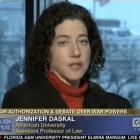 Canada’s Liberal government has introduced legislation aimed at targeting harmful content online.
Canada’s Liberal government has introduced legislation aimed at targeting harmful content online.
If passed, the digital safety commissioner would oversee the censorship of child pornography, pro-terrorism content, hate speech, and other harmful posts the commissioner deems harmful on social media platforms.
The legislation makes no distinction between child pornography and “hate speech.” It also includes fines for noncompliance.
"Canadians are increasingly concerned social media is being used to spread potentially illegal and abusive content such as hate speech and child sexual exploitative content. We need consistent and transparent rules for how online platforms address hate, incitement of violence and harmful online content," Steven Guilbeault, Heritage Minister, said of the legislation.
Some scholars believe the proposed law simply seeks to regulate content that is already illegal.
“This is really a proposal that is focused on regulating content that is for the most part illegal under Canadian law already," Vivek Krishnamurthy, a law professor at the University of Ottawa, said of the legislation.
Some believe the legislation comes too little, too late.
"However, this announcement is cold comfort to the survivors of brutal online sexual exploitation who begged the Liberal government to apply Canadian laws in the allegations regarding Pornhub. An internet umpire for good behaviour is no substitute for enforcing the laws and standing up for the rights of abuse victims," Charlie Angus, NDP ethics critic, said.
Others, however, are concerned about the legislation’s reach.
“This is exactly the kind of filtering mandate that has had civil society and human rights advocates ringing alarm bells in Europe for several years...” Daphne Keller, the Platform Regulation Director of the Stanford Cyber Policy Center, tweeted.
She added that the proposed legislation would disproportionately target minorities.
“We have every reason to expect people of color and other marginalized or vulnerable groups to get flagged more, reported to police more, and mistreated more after that happens,” she continued.
“The harms from platforms surveilling users and reporting them to police will also disproportionately hurt vulnerable groups like undocumented immigrants, parolees, or sex workers -- whether by getting them silenced, banned, and reported, or by causing self-censorship.”
Keller further drew comparisons with censorship in the United States.
“If anyone doubts that unscrupulous people can come to, and abuse, government powers like these... I invite them to look at the past five years in the United States.”









